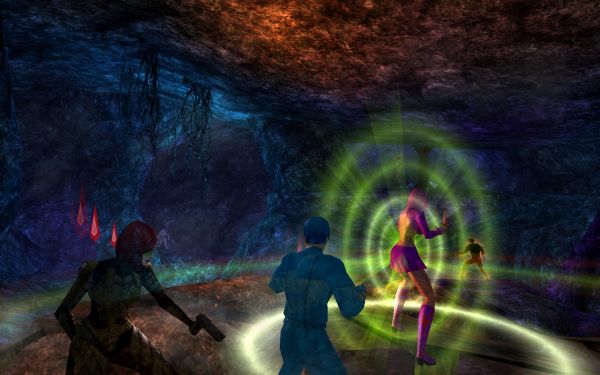
In Japan, “games you can only play on PC” is sometimes used as an euphemism for what we call adult games. But there are many others. The PC has really stood the test of time as a gaming platform, among other uses.
I still have my first Personal Computer; it is stowed away on a shelf at work. It is a Goldstar AT compatible with a 286 processor running at a whopping 10 MHz. (I don’t remember if that was with or without the turbo mode; possible it was 12 MHz with turbo.) I also had the foresight to get a 3.5 inch floppy disk drive in addition to the standard 5.25″.
I don’t have the receipt, but I believe the Goldstar cost me in excess of 17,000 Norwegian kroner, a bit under $3000. It was in that price range, at least it was below 20,000. Finally an affordable computer!
Perhaps needless to say, but that was the most expensive personal computer I have ever bought. And even though inflation has been low for all these years, it has not been zero. $3000 was quite a bit more in the 1980s than it is today. In particular, income was lower for everyone; especially here in Norway. (American workers have, by and large, the same income today as they had in the late 1990s. Sucks to be them, but then they had a glory time behind them, so they are still ahead of most of Europe even today. But not of Norway.) I still find it hard to believe that I shelled out that much money for a computer back when money was tight. I probably had to borrow most of it. But then I was a real enthusiast, back in those days.
I have been through many generations of personal computers since then. Some of them I replaced because they broke down, completely (in a couple of cases) or partly (usually the CD-ROM or floppy first, then the main cooling fan). But usually the true reason was that there was some new game that would run unbearably slowly, if at all, on my current machine. In the case of The Sims and later The Sims 2, the original game might run decently on my existing hardware, but then came an expansion pack and it ran more slowly, then another expansion pack and now it ran so slowly it was hardly fun anymore. So I got a new computer and it would run like water, until a couple of years and twice that many expansion packs later.
I actually named my last single-core desktop computer “Oblivion”, because I bought it specifically to run that game. It was like a slideshow on the previous computer, which was two years old. The name proved to be painfully prescient, for dual-core machines took over the market mere months later. The computer itself had to be repaired twice, but when it melted down the last time, North Corporation that made it had recently gone belly-up. Oblivion indeed. By now I think I could repair it myself by replacing the power supply with a new and stronger. The computer still has a 10 000 rpm Raptor disk in it, after all. But the truth is that I now have two desktop computers that are better than it in virtually every way.
The next desktop was Terra, my current beast of burden. In the meantime I had a Dell dual-core laptop for my laptopping needs (or wants, rather). It was somewhat short-lived (Dell, after all) but it opened my eyes to the benefits of having two cores. So, two cores good, four cores better, right? I bought one of the new quad-core computers from Intel. I skimped on the video card and splurged on the CPU, because processing power is the limiting factor in The Sims games. It was only after I got it that I found out that The Sims 2 only uses one core, no matter how many there are. (The Sims 3 however uses them all.) Even with one core, though, it was faster than the Oblivion machine. This was in November 2007. And it is still fast enough for all my Simming needs (or wants, again).
We are getting to the point, finally! The computer I had before Oblivion is named “ITL2004” in my network, implying that it was bought in 2004. The Oblivion computer was bought in March or April 2006. Terrra was bought in November 2007. Yet now we are seeing the final months of 2010, and it is still not obsolete. Â Sure, there is a new Sims 3 expansion pack coming out in October… but I can run the current expansion while two of the four cores are occupied with folding proteins. Actually, those two cores have done that pretty much day and night since the computer was new. If I got a new machine with six cores (“hexa-core”, though the name is less used), four of them would be folding proteins anyway. You can actually get up to 12 cores in a single PC now, although these tend to be expensive. And unsurprisingly, sales to the home market remain low.
I am probably not the only person who suddenly realizes this. Sales of desktop computers are tumbling. Due to the rate of progress known as “Moore’s Law”, you get twice as much bang for the buck every 18 months. (Actually, this time seems to be shrinking, as predicted by Ray Kurzweil and others: The acceleration of accelerating technology is accelerating.) But whereas we would in the past buy a twice as good computer for the same price, now we buy good enough computers for half price. Or wait another year and a half and buy them for a quarter of the price. For many users, a small and cheap “netbook” is good enough these days. Or even an iPad, although these have real limitations compared to a notebook PC.
You may think that it is the economy: People can’t afford to buy new computers unless these are really cheap, and then software developers don’t make games or other software that needs those powerful machines, since people don’t have them. That would have been a reasonable theory except for the lead time. The Sims 3 was designed during the last frenzied years of the boom. It seems highly unlikely that EA’s game developers, unlike almost everyone else, saw what was coming. Well, they may have been reading the Chaos Node, but I seriously doubt it.
Rather, I think we have reached a plateau in software development. It is basically no longer feasible to create a project so large that the current computers cannot run it easily. The obvious exception is projects that involve many people, like corporate databases and such. But the personal computer, in the more or less literal sense, may have reached the end of the road. Not in defeat, but in victory. Crossed the finish line.
But I may be wrong. Betting against human ingenuity is often a losing proposition…








